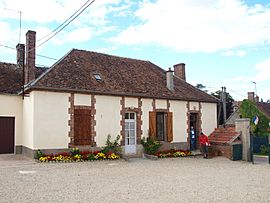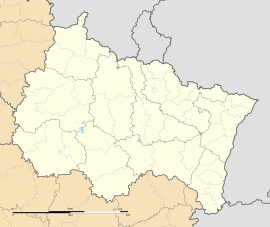La Louptière-Thénard facts for kids
Quick facts for kids
La Louptière-Thénard
|
|
|---|---|

The town hall in La Louptière-Thénard
|
|
| Country | France |
| Region | Grand Est |
| Department | Aube |
| Arrondissement | Nogent-sur-Seine |
| Canton | Nogent-sur-Seine |
| Intercommunality | Nogentais |
| Area
1
|
13.68 km2 (5.28 sq mi) |
| Population
(Jan. 2019)
|
290 |
| • Density | 21.2/km2 (54.9/sq mi) |
| Time zone | UTC+01:00 (CET) |
| • Summer (DST) | UTC+02:00 (CEST) |
| INSEE/Postal code |
10208 /10400
|
| 1 French Land Register data, which excludes lakes, ponds, glaciers > 1 km2 (0.386 sq mi or 247 acres) and river estuaries. | |
La Louptière-Thénard is a small and peaceful commune, which is like a town or village, located in the Aube département. This area is in the north-central part of France. In 2017, about 289 people called La Louptière-Thénard their home.
Contents
About La Louptière-Thénard
La Louptière-Thénard is a charming place in the French countryside. It's known for its quiet atmosphere and natural beauty. The commune is part of the Aube department, which is one of the 96 departments in mainland France.
Where is La Louptière-Thénard?
This commune is found in the Nogent-sur-Seine arrondissement and the Nogent-sur-Seine canton. These are smaller administrative areas within the Aube department. It's located in a region that is mostly flat, with an average elevation of about 196 meters (around 643 feet) above sea level.
Who Lives There?
As of January 2019, the population of La Louptière-Thénard was around 290 people. This makes it a very small community. The number of people living in a commune is important for local planning and services.
Local Government
Like all communes in France, La Louptière-Thénard has its own local government. The head of the commune is the mayor. From 2008 to 2014, the mayor was Christian Triché. The mayor and the local council work together to manage the commune's daily life, including things like local services and public spaces.
The commune is also part of a larger group called an "intercommunality" known as Nogentais. This means it works with nearby communes on shared projects and services.
See also
 In Spanish: La Louptière-Thénard para niños
In Spanish: La Louptière-Thénard para niños
 | Sharif Bey |
 | Hale Woodruff |
 | Richmond Barthé |
 | Purvis Young |



